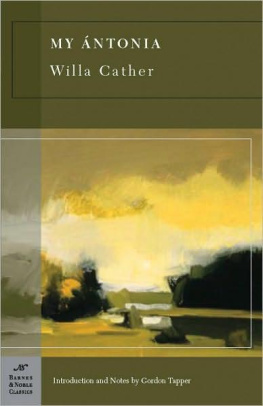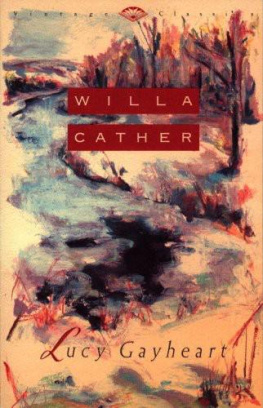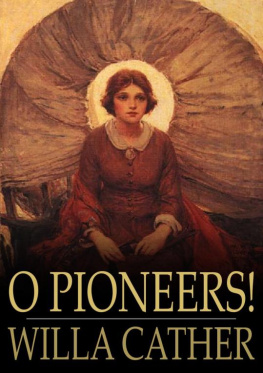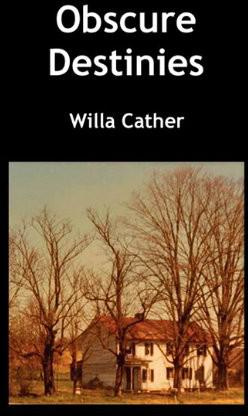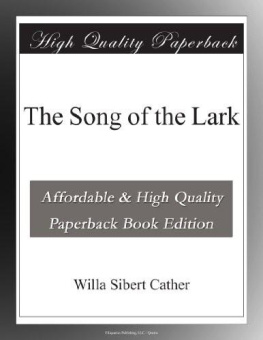Willa Cather - My Antonia (Barnes & Noble Classics)
Here you can read online Willa Cather - My Antonia (Barnes & Noble Classics) full text of the book (entire story) in english for free. Download pdf and epub, get meaning, cover and reviews about this ebook. year: 2005, publisher: Spark Educational Publishing, genre: Art. Description of the work, (preface) as well as reviews are available. Best literature library LitArk.com created for fans of good reading and offers a wide selection of genres:
Romance novel
Science fiction
Adventure
Detective
Science
History
Home and family
Prose
Art
Politics
Computer
Non-fiction
Religion
Business
Children
Humor
Choose a favorite category and find really read worthwhile books. Enjoy immersion in the world of imagination, feel the emotions of the characters or learn something new for yourself, make an fascinating discovery.
- Book:My Antonia (Barnes & Noble Classics)
- Author:
- Publisher:Spark Educational Publishing
- Genre:
- Year:2005
- Rating:4 / 5
- Favourites:Add to favourites
- Your mark:
- 80
- 1
- 2
- 3
- 4
- 5
My Antonia (Barnes & Noble Classics): summary, description and annotation
We offer to read an annotation, description, summary or preface (depends on what the author of the book "My Antonia (Barnes & Noble Classics)" wrote himself). If you haven't found the necessary information about the book — write in the comments, we will try to find it.
My Antonia (Barnes & Noble Classics) — read online for free the complete book (whole text) full work
Below is the text of the book, divided by pages. System saving the place of the last page read, allows you to conveniently read the book "My Antonia (Barnes & Noble Classics)" online for free, without having to search again every time where you left off. Put a bookmark, and you can go to the page where you finished reading at any time.
Font size:
Interval:
Bookmark:
Table of Contents
FROM THE PAGES OF MY NTONIA
If there was a road, I could not make it out in the faint starlight. There was nothing but land: not a country at all, but the material out of which countries are made. (page 11)
That is happiness; to be dissolved into something complete and great. When it comes to one, it comes as naturally as sleep. (page 17)
The low sky was like a sheet of metal; the blond cornfields had faded out into ghostliness at last; the little pond was frozen under its stiff willow bushes. Big white flakes were whirling over everything and disappearing in the red grass. (page 42)
Whenever I saw her come up the furrow, shouting to her beasts, sunburned, sweaty, her dress open at the neck, and her throat and chest dust-plastered, I used to think of the tone in which poor Mr. Shimerda, who could say so little, yet managed to say so much when he exclaimed, My n-tonia! (page 78)
Winter lies too long in country towns. (page 110)
I aint never forgot my own country. (page 142)
She remembered home as a place where there were always too many children, a cross man and work piling up around a sick woman. (page 174)
In that singular light every little tree and shock of wheat, every sunflower stalk and clump of snow-on-the-mountain, drew itself up high and pointed; the very clods and furrows in the fields seemed to stand up sharply. I felt the old pull of the earth, the solemn magic that comes out of those fields at nightfall. I wished I could be a little boy again, and that my way could end there. (page 192)
In the course of twenty crowded years one parts with many illusions. I did not wish to lose the early ones. Some memories are realities, and are better than anything that can ever happen to one again. (page 197)
It was no wonder that her sons stood tall and straight. She was a rich mine of life, like the founders of early races. (page 211)


Published by Barnes & Noble Books
122 Fifth Avenue
New York, NY 10011
www.barnesandnoble.com/classics
My ntonia was first published in 1918.
Published in 2003 by Barnes & Noble Classics with new Introduction, Notes,
Biography, Chronology, Comments & Questions, and For Further Reading.
This trade paperback edition published in 2004.
Introduction, Notes, and For Further Reading
Copyright 2003 by Gordon Tapper.
Note on Willa Cather, The World of Willa Cather and My ntonia, and Comments & Questions
Copyright 2003 by Barnes & Noble, Inc.
All rights reserved. No part of this publication may be reproduced or transmitted in any form or by any means, electronic or mechanical, including photocopy, recording, or any information storage and retrieval system, without the prior written permission of the publisher.
Barnes & Noble Classics and the Barnes & Noble Classics colophon are trademarks of Barnes & Noble, Inc.
My ntonia
ISBN-13: 978-1-59308-202-4 ISBN-10: 1-50308-202-9
eISBN: 978-1-411-43388-5
LC Control Number 2004100758
Produced and published in conjunction with:
Fine Creative Media, Inc.
322 Eighth Avenue
New York, NY 10001
Michael J. Fine, President & Publisher
Printed in the United States of America
QM
7 9 10 8 6
WILLA CATHER

Wilella Sibert Cather was born on December 7, 1873, in the small Virginia farming community of Winchester. When she was ten years old, her parents moved the family to the prairies of Nebraska, where her father opened a farm mortgage and insurance business. Home-schooled before enrolling in the local high school, Cather had a mind of her own, changing her given name to Willa and adopting a variation of her grandmothers maiden name, Seibert, as her middle name. As a young woman she met Annie Sadilek Pavelka, a schoolmate who would later become the main character in her acclaimed novel My ntonia (1918).
During Cathers studies at the University of Nebraska, she worked as a drama critic to support herself and published her first piece of short fiction, Peter, in a Boston magazine. After graduation, her love of music and intellectual pursuits inspired her to move to Pittsburgh, Pennsylvania, where she edited the family magazine Home Monthly, wrote theater criticism for the Pittsburgh Daily Leader, and taught English and Latin in local high schools. Cather published her first short story collection, The Troll Garden, in 1905. She moved to New York City the following year to work for McClures Magazine as a writer and eventually the magazines managing editor.
Considered one of the great figures of early-twentieth-century American literature, Willa Cather derived her inspiration from the American Midwest, which she considered her home. Never married, she cherished her many friendships, some of which she had maintained since childhood. Her intimate coterie of women writers and artists motivated Cather to produce some of her best work. Sarah Orne Jewett, a successful author from Maine whom Cather had met during her McClures years, inspired her to devote herself full-time to creating literature and to write about her childhood, which she did in several novels of the prairies; one of the best known is O Pioneers! (1913), whose title comes from a poem by Walt Whitman. A critic of the rise of materialism, Cather addressed the social impact of the developing industrial age in A Lost Lady (1923), which was made into a film starring Barbara Stanwyck. For One of Ours (1922), a novel about World War I, she was awarded the Pulitzer Prize in 1923.
In her later years Cather produced some of her most recognized work. For Death Comes for the Archbishop (1927) she won a gold medal from the American Academy of Arts and Letters. In 1933 she received the Prix Femina Americaine for Shadows on the Rock (1931), a collection of short stories. Two years after publishing her last novel, The Best Years (1945), Willa Cather died of a cerebral hemorrhage, on April 24, 1947, in New York City. A collection of short fiction, The Old Beauty and Others (1948), and a literary treatise, On Writing (1949), were published after her death. Among Cathers other accomplishments were honorary doctorate degrees from Columbia, Princeton, and Yale Universities.
THE WORLD OF WILLA CATHER AND MY NTONIA
| 1638 | Dutch explorer Peter Minuit leads Swedish immigrants to establish the first Swedish colony in Delaware Bay. |
| 1848 | The California Gold Rush stimulates emigration from Scandinavia to the U.S. Midwest. |
| 1855 | Walt Whitman publishes the first edition of Leaves of Grass, a collection of poems he will expand in several editions before his death in 1892; his poem Pioneers! O Pioneers!, which will have an impact on Willa Cather, will be published in his collection Drum Taps in 1865 and incorporated into the 1881-1882 edition of Leaves of Grass. |
| 1862 | The passage of the Homestead Act encourages immigrants to cultivate the U.S. prairies; immigrant settlement in the Midwest increases significantly. |
| 1873 | On December 7 Wilella Cather is born, the eldest of her parents seven children, in Winchester, Virginia, a farming village near the Blue Ridge Mountains. |
| 1877 | Sarah Orne Jewett, who will become one of Cathers mentors , publishes Deephaven, her first collection of stories and sketches, about small-town life in New England. |
Font size:
Interval:
Bookmark:
Similar books «My Antonia (Barnes & Noble Classics)»
Look at similar books to My Antonia (Barnes & Noble Classics). We have selected literature similar in name and meaning in the hope of providing readers with more options to find new, interesting, not yet read works.
Discussion, reviews of the book My Antonia (Barnes & Noble Classics) and just readers' own opinions. Leave your comments, write what you think about the work, its meaning or the main characters. Specify what exactly you liked and what you didn't like, and why you think so.

